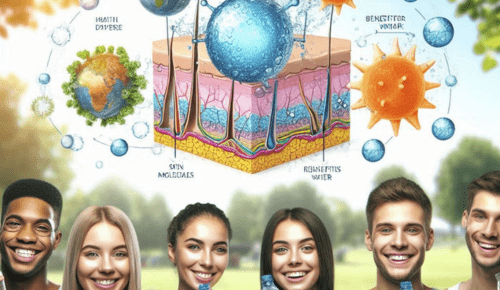The Science of Hydration: Why Your Skin Needs It

Hydration is a fundamental aspect of maintaining healthy, radiant skin. The skin relies on moisture to function optimally, and a well-hydrated complexion is more resilient, youthful, and balanced. Understanding the science behind skin hydration can help you make informed choices about moisturizing products and skincare routines. Here’s why hydration is essential and how you can effectively keep your skin moisturized.
The Role of Water in Skin Health
The skin is the body’s largest organ, and just like any other organ, it requires water to maintain its structure and function. The outermost layer of the skin, known as the stratum corneum, acts as a barrier to protect against environmental damage and prevent excessive water loss. When this barrier is compromised, the skin can become dry, rough, and prone to irritation.
Proper hydration helps maintain:
- Elasticity and suppleness: Hydrated skin appears plumper and smoother, reducing the appearance of fine lines and wrinkles.
- Barrier function: Moisturized skin is better equipped to defend against pollutants, bacteria, and UV damage.
- Cell regeneration: Water supports the natural shedding of dead skin cells and promotes the renewal of fresh, healthy skin.
How Hydrating Products Work
Moisturizers and hydrating products play a crucial role in maintaining the skin’s water balance. These products work through three primary mechanisms:
- Humectants: Ingredients like hyaluronic acid, glycerin, and aloe vera attract water from the environment and deeper layers of the skin, keeping it hydrated.
- Emollients: Oils and fatty acids, such as shea butter and squalane, help smooth and soften the skin by filling in gaps between skin cells.
- Occlusives: Substances like petrolatum and beeswax create a protective barrier on the skin’s surface to prevent water loss.
A well-formulated hydrating product contains a combination of these ingredients to deliver optimal moisture retention and skin nourishment.
Factors That Contribute to Dehydrated Skin
Several internal and external factors can lead to dehydrated skin, including:
- Environmental conditions: Cold weather, wind, and air conditioning can strip the skin of moisture.
- Harsh skincare products: Over-exfoliation, strong cleansers, and alcohol-based products can disrupt the skin’s moisture barrier.
- Aging: As we age, the skin’s ability to retain moisture declines, making hydration even more crucial.
- Diet and lifestyle: Insufficient water intake, excessive caffeine consumption, and poor nutrition can impact skin hydration levels.
How to Keep Your Skin Hydrated
To maintain optimal hydration levels, consider these skincare tips:
- Use a gentle cleanser: Avoid harsh soaps that strip natural oils from your skin.
- Apply hydrating serums: Look for serums containing hyaluronic acid or ceramides to boost hydration.
- Layer your skincare products: Start with lightweight hydrating products and seal in moisture with a richer face cream.
- Drink enough water: While external hydration is important, internal hydration plays a significant role in skin health.
- Protect your skin barrier: Use sunscreen daily to prevent moisture loss caused by UV exposure.
Skin hydration is essential for maintaining a healthy and youthful complexion. By understanding how hydration works and incorporating effective moisturizing products into your skincare routine, you can keep your skin resilient, smooth, and protected from external stressors. Choosing the right hydrating products and adopting a moisture-preserving lifestyle will ensure long-term skin health and radiance. You can test with immune-supporting functional tea.
